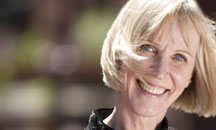This is a difficult question to answer. I usually ask: "For example?" Specifically, I can say yes, Josephine owned a disagreeable dog named Fortunè, or that yes, she escaped Martinique under cannon fire, but in general…?
In general, the facts are the bones of the story, the fiction flesh. I tend to be obsessive about accuracy—so my novels are based on fact as much as is possible. Aside from the details of daily life, the specific dialogue, much of what happens in the novels has a basis in some historical text. I comb journals, memoirs and letters collecting nuggets of information much in the same way some people collect stamps. When Josephine and Alexandre marry, for example, and one of the men in Alexandre's regiment is unable to attend because of "an indisposition" going around Versailles, there is, in fact, "an indisposition" going around Versailles at that time.
Facts can be misleading, however. Many accounts are contradictory, suspect, or difficult to judge. When Josephine was in prison, for example, did she in fact tell her cellmate that she would not die, that she would become Queen? Did a woman outside the prison window signal that Robespierre was dead? This is a story Josephine liked to tell, so I'm inclined to believe it, but to what extent might she (and others) have created fictions of their own?
Robespierre said, "History is fiction," and I have to agree. The line between fact and fiction is a very difficult one to define. The more one delves into the past, the more fact sometimes resembles fiction and fiction fact. My intent has been to use fiction as a tool, as a means of knowing Josephine and experiencing her world. It is important for me to feel that my fictional history could, in fact, have happened. While writing, I think of my evolving novel as one might view an archaeological dig: with each draft I want to dig down closer to "the truth." To that end I have respected facts as welcome signposts in a wilderness. In the process I have also come to regard certain "facts" as fiction. In the realm of scholarship on the subject of Josephine, many questions remain.
Are you ever criticized by historians?
Surprisingly enough: no. When The Many Lives & Secret Sorrows of Josephine B. — the first Josephine B. title — was published I braced myself for an attack by what I thought of as the historical police. But silence. In fact, to my very great surprise, when the first of the Trilogy came out in France, a French historian called my publisher to congratulate her on publishing it. Years later my work was recommended by French historians to a PBS producer of a documentary on Napoleon, which lead to me being interviewed for that series along with historians I admired so much. It was pointed out to me at the time that it was unusual for a novelist to be included as an "expert" in such a program.
Who is your favorite character: Josephine or Louise?
It's like choosing between children to select one character over another. I'm terribly fond of both Josephine and Louise. Of the two, I would love to have Josephine as a friend or a dinner-party guest, but I think I would prefer to be Louise, because of her passion for horses and the wild.
What is your next novel going to be about? Do you envision more than one book about Louise? You must have discovered so many interesting people in your years of researching Mistress of the Sun. Do you plan to focus on one of these characters in future novels?
There are so many fascinating characters — so many fascinating stories — in this period, I will definitely be writing more about them. Louise will be in these novels, but as a secondarly-character. (For a more detailed answer on the specific possiblilities, see the answer to the question "What's next?")
How do you work? (Do you work on computer or do you write long-hand? In the morning or at night?)
I write first thing in the morning, beginning before dawn. I'll break at 8:00 or so to dress and have breakfast, then return to my desk. I'll carry on as long as the demands of life will allow, which is usually until 1:00. I write on computer, but edit on the page ("hard copy"). There is never enough time.
What interested you about Louise de la Vallière?
A reader recently wrote: "I enjoyed the book very much--you did the near impossible--you brought Louise Vallière to life and made her a comprehensible and touching character to modern eyes. Usually in most histories on Louis XIV, she is presented as crying ninny who goes off to a convent when Louis moves into Versailles, but you actually made her life interesting."
For me it was the contrast of the conventional portrait of Louise as, as the reader says, a "crying ninny" and wall-flower, together with the accounts of her amazing ability on horseback and as a hunter that provoked my curiosity. "What's wrong with this picture?" I thought. And thus began my consuming interest in her.

No comments:
Post a Comment